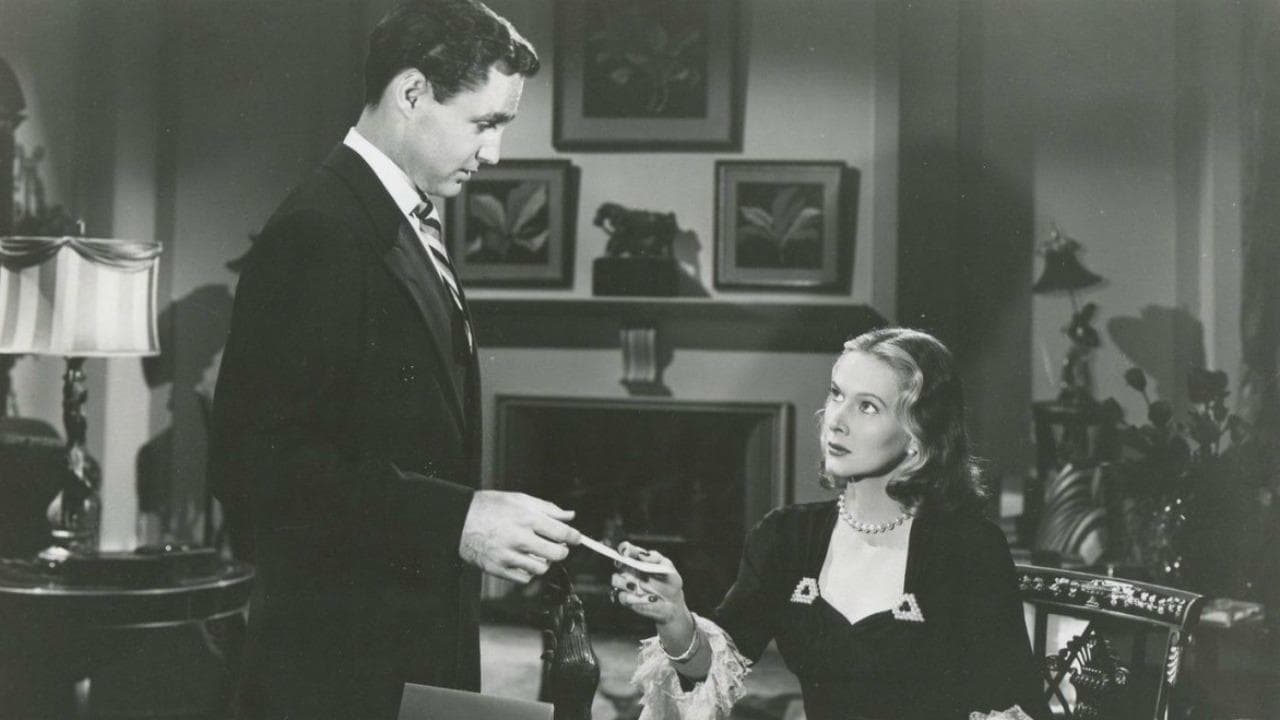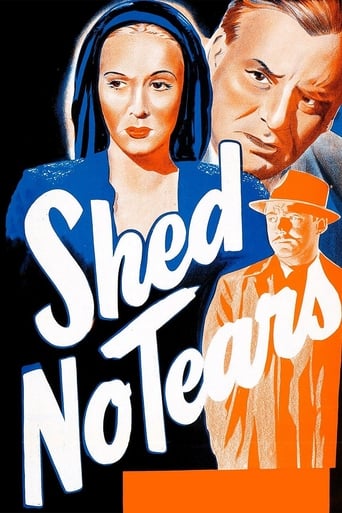

one of my absolute favorites!
... View MoreBest movie of this year hands down!
... View MoreIt's a good bad... and worth a popcorn matinée. While it's easy to lament what could have been...
... View MoreIt is encouraging that the film ends so strongly.Otherwise, it wouldn't have been a particularly memorable film
... View MoreDirected by Jean Yarbrough and starring Wallace Ford and June Vincent, Shed No Tears was once one of those lost film noirs that noiristas craved to see. Now widely available to view, it proves to be a decent journey into noirville, even if it becomes a touch shaky come the final third. Plot has Vincent as a devious femme fatale wife who convinces her husband (Ford) to fake his own death. The plan is to get rich on the insurance claim, but soon it becomes apparent that hubby is caught in a web of murder, blackmail and treachery. The plot dynamics are laid out for us very early in the peace, leaving the rest of the narrative to tease us with the shifty shenanigans of the protagonists. Classic noir staples are adhered to with the characterisations, viper woman, dupes, dopes, crooks and cronies. Yarbrough moves it along at a good old "B noir" clip, while the screenplay has enough twists and surprises in it to keep the noir faithful pleased. 7/10
... View MoreThere is a sleazy private detective (Johnstone White) in a prominent role as blackmailer and conniver. I swear his character is lifted directly from Clifton Webb's in "Laura," which appeared a few years earlier to bouquets of praise. White is a flit, like Waldo Lydekker. He looks a little like Clifton Webb. He uses the same elegant phrases: "You may abandon that ree-DICK-ulous position." He pays great attention to his wardrobe and grooming, and he's the most interesting character in this twisted hour-long B story of theft, fraud, intrigue, adultery, and murder.Wallace Ford fakes his own death to gain insurance money for him and his wife, Jean Parker. Unknown to Ford, Parker has a boy friend on the side. Tom, Ford's virtuous son by a previous marriage enters the picture, convinced there was some skullduggery involved. He hires White, the private eye, to dig into the matter and White finds out everything and tries to blackmail everyone and then it gets anfractuous and somebody gets shot and somebody falls out the window -- not the same person who got shot -- and it's all a little confusing, but not as confusing as, say, "War and Peace." Not in my estimation anyway.It's an interesting and uninspired move. It exemplifies the Peter Principle. All of the actors, bit parts included, seem to have worked their way up the ladder until they have reached their level of incompetence. Their careers will go nowhere. The performers walk from place to place, as directed, and recite their lines with the same credibility that you and I might show if we'd had a few acting lessons. On those rare occasions when Jean Parker, than whom no femme was ever more fatale, smiles, the smile carries all the significance of that of a synchronized swimmer. There isn't a moment when you believe anything other than that you're watching a movie in which nobody is bringing much to the party.As a performer, Wallace Ford is made of wood here. Too bad. He was capable of better things in better movies. (He was Frankie McPhillip in "The Informer".) He was reliable as a supporting player, usually some Irishman, in other works, but was always hampered by a voice that sounds as if his false teeth were loose or he had half a load on.Overall it's pretty dull except for Johnstone White as the recherché shamus.
... View MoreYou'd think after watching "Double Indemnity" and "The Postman Always Rings Twice", people desiring to defraud insurance agencies would have learned a lesson, but not these film noir characters, which includes the typical older man/younger woman, and the younger woman intends to use the money to run away with her lover. But the older husband is a bit wiser than his wife thinks he is, and just as she thinks she's getting away with everything, he's back to get his cut, with or without her remaining at his side.Slightly clever repeat of an old theme, this offers some suspense and a femme fatal (June Vincent) worthy of inclusion in the hall of fame for film noir vixens. Wallace Ford gives an excellent performance of the seemingly cuckolded husband with Mark Roberts the unfortunate lover who is too consumed with Vincent to realize he's involved in a loosing game. There's also the family angle of Ford's first wife's son, especially in a scene with Vincent that may or may not be attempted seduction simply to keep his mouth shut. But there's too many scenes of nothing but talk to take away from the intrigue that unfortunately leads to a predictable conclusion.
... View MoreWallace Ford fakes his death in a hotel room fire. He hooks up with his much younger wife, June Vincent, and together they plan on bilking the insurance company for the payoff of 50 grand which will reunite them once she collects. She watches as he gets on the bus, then meets her boyfriend in the parking lot and they talk of how they're going to spend the money.All this happens in the first ten minutes or so - there's no fat on this baby.But meanwhile, Ford's son thinks that something is amiss, he thinks that Vincent killed Ford herself and he hires an investigator to prove it. This is where things really start perking as the Clifton Webb-like sleuth, played wonderfully by Johnstone White, soon figures out what's going on and he starts playing the supposed widow and the son against each other as well as Ford himself who comes back to town and discovers his wife in a clinch with her boyfriend.But wait - there's still more but you're going to have to find out for yourself. Jean Yarbrough, veteran of just about every kind of movie and TV genre, manages to keep one's interest despite a lack of noirish touches. It's likely that he had to get this done in a week or so, so there wasn't any time for complicated camera set-ups. The story here is the main thing, you likely will not be disappointed.
... View More